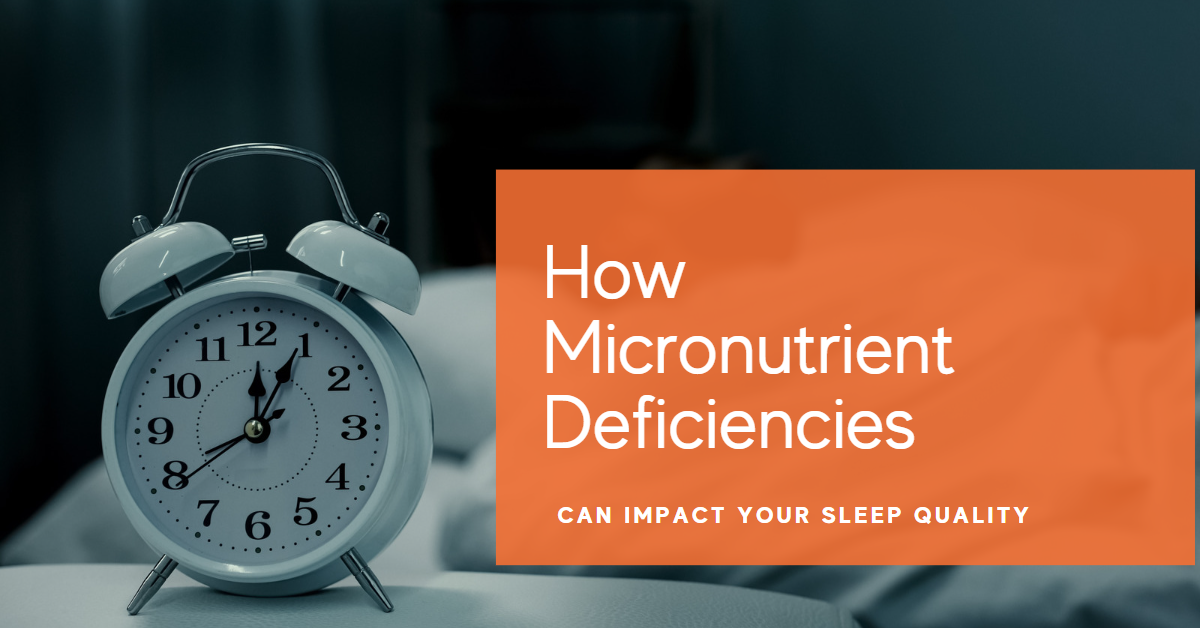Do you find yourself struggling to fall asleep, no matter how hard you try? You may be surprised to learn that micronutrient deficiencies could be playing a role in your sleep issues. While there are many factors that can contribute to insomnia, including stress and certain medical conditions, an unbalanced diet lacking essential vitamins and minerals could be a culprit. In this article, we will explore some of the micronutrient deficiencies that may be impacting your sleep quality, and what you can do to address them.
Key Highlights
- Micronutrient deficiencies can impact sleep quality, including magnesium, vitamin D, and calcium.
- Magnesium helps regulate relaxation and melatonin production, while vitamin D affects sleep patterns and circadian rhythms.
- Calcium supports proper hormone regulation for better sleep and can convert tryptophan into serotonin, which then becomes melatonin in the brain.
- Food sources rich in these micronutrients include pumpkin seeds, chia seeds, almonds, spinach, cashews, peanuts, soymilk, fatty fish, cod liver oil, dairy products, kale, and broccoli.
- Women over 31 years old should aim for a daily intake of 320 milligrams of magnesium, while those over 19 years old should aim for 600 IU of vitamin D, and women over 51 years old should aim for 1,200 milligrams of calcium.
- Supplements can also be helpful in ensuring adequate intake of these micronutrients, and a blood test can determine nutrient levels.
The Importance of Magnesium for Sleep
Magnesium is an essential mineral that plays a crucial role in many bodily functions, including muscle function, blood sugar control, and nerve function. Studies have shown that magnesium supplements can help improve sleep quality by activating the parasympathetic nervous system (PNS), which regulates relaxation and helps the body transition into a state of rest. Additionally, magnesium can help regulate melatonin production, a hormone that controls your sleep-wake cycle.
Foods rich in magnesium include pumpkin seeds, chia seeds, almonds, spinach, cashews, peanuts, and soymilk. Women over 31 years old should aim for a daily intake of 320 milligrams of magnesium.
The Role of Vitamin D in Sleep
Vitamin D, also known as the “sunshine vitamin,” helps the body absorb calcium and maintain strong bones and muscle function. Research has also shown that vitamin D is involved in regulating sleep by affecting the areas of the brain that control sleep patterns and circadian rhythms. A deficiency in vitamin D has been linked to sleep disorders and poor sleep quality.
Natural sources of vitamin D include fatty fish such as trout, salmon, tuna, and mackerel, as well as cod liver oil. Milk and orange juice are often fortified with vitamin D, making them another source. Women over 19 years old should aim for a daily intake of 600 IU of vitamin D, with an upper limit of 4,000 IU per day.
The Impact of Calcium on Sleep
Calcium is a mineral that is essential for strong bones and teeth, muscle function, and nerve communication. Low levels of calcium have been linked to difficulty falling asleep, while adequate levels have been shown to improve sleep quality. Calcium can also help convert tryptophan into serotonin, which then becomes melatonin in the brain.
Sources of calcium include dairy products such as milk, yogurt, and cheese, as well as canned salmon, kale, and broccoli. Women over 51 years old should aim for a daily intake of 1,200 milligrams of calcium.
It’s important to note that while a combination of factors may contribute to insomnia, getting enough of these essential micronutrients can be an important step in improving sleep quality. If you suspect that you may have a deficiency, consider asking your doctor for a blood test to determine your nutrient levels. And if you struggle to get enough of these vitamins and minerals through your diet, supplements can be a helpful option to consider.
If you’re struggling to fall asleep and stay asleep, it’s worth considering the role that micronutrient deficiencies may be playing in your sleep quality. Magnesium, vitamin D, and calcium are just a few of the essential vitamins and minerals that can impact your sleep patterns. By eating a balanced diet rich in these micronutrients or taking supplements if needed, you may be able to improve your sleep quality and wake up feeling more rested and refreshed.
Citation List
- Abbasi B, Kimiagar M, Sadeghniiat K, Shirazi MM, Hedayati M, Rashidkhani B. The effect of magnesium supplementation on primary insomnia in elderly: A double-blind placebo-controlled clinical trial. J Res Med Sci. 2012;17(12):1161-1169.
- Chellappa SL, Vujovic N, Williams JS, et al. Effects of vitamin D supplementation on cognitive and emotional functioning in young adults – A randomised controlled trial. PLoS One. 2018;13(11):e0201210. Published 2018 Nov 14. doi:10.1371/journal.pone.0201210
- Dibaba DT, Xun P, Fly AD, Yokota K, He K. Dietary magnesium intake and sleep quality among U.S. adults. BMC Med. 2016;14(1):26. Published 2016 Feb 12. doi:10.1186/s12916-016-0571-4
- Grandner MA, Jackson N, Gerstner JR, Knutson KL. Dietary nutrients associated with short and long sleep duration. Data from a nationally representative sample. Appetite. 2013;64:71-80.
- Innes KE, Selfe TK, Agarwal P. Role of magnesium in the pathogenesis and treatment of migraine. Expert Rev Neurother. 2018;18(9):735-747. doi:10.1080/14737175.2018.1501331
- Institute of Medicine (US) Committee to Review Dietary Reference Intakes for Vitamin D and Calcium; Ross AC, Taylor CL, Yaktine AL, Del Valle HB, editors. Dietary Reference Intakes for Calcium and Vitamin D. Washington (DC): National Academies Press (US); 2011. Available from: https://www.ncbi.nlm.nih.gov/books/NBK56070/







